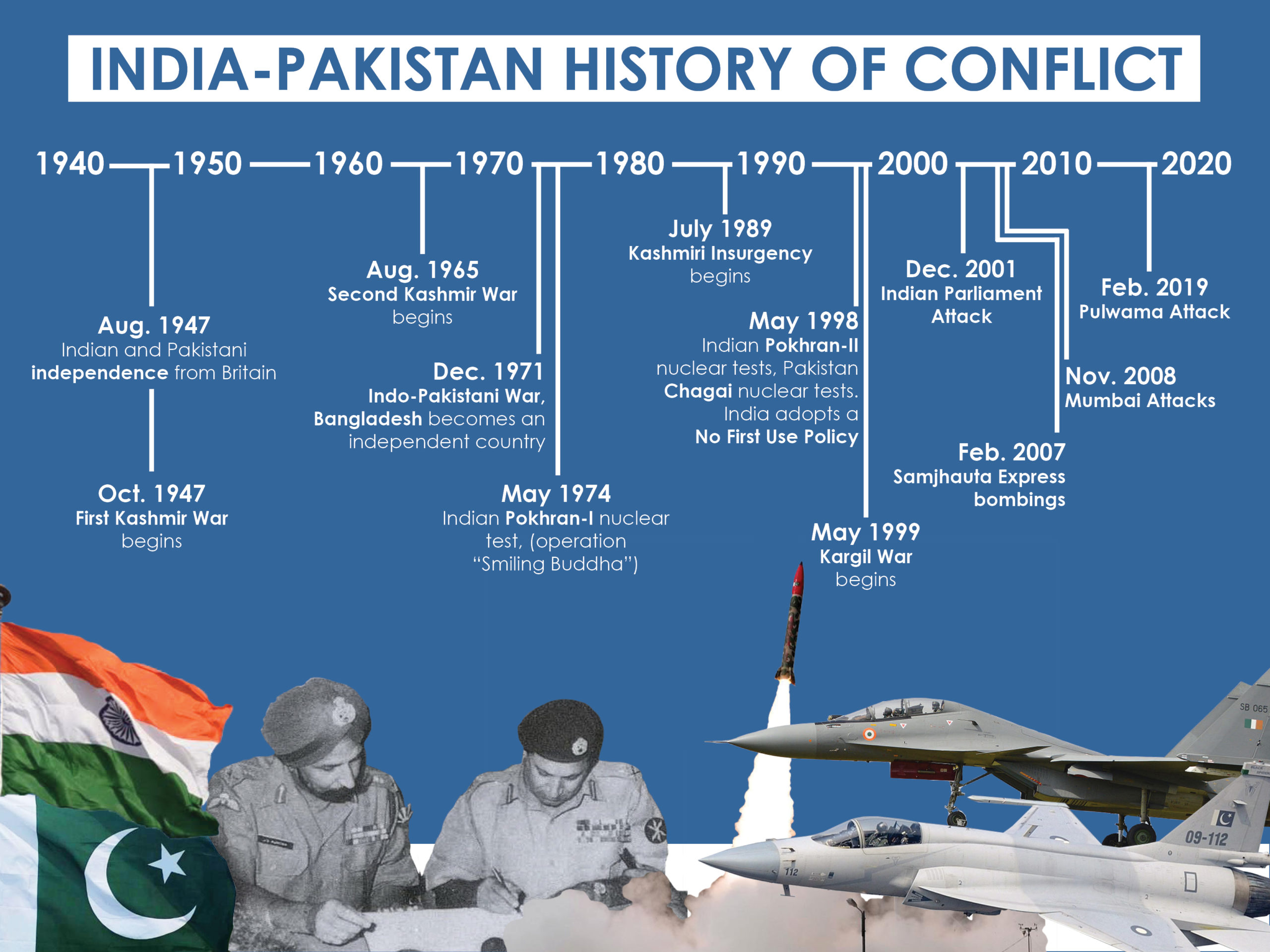India-Pakistan Conflict: A Brief but Powerful Summary
The Conflict's Origins
The foundation of the India-Pakistan conflict was laid during the 1947 partition of British India. This division gave rise to two new nations: secular but Hindu-majority India and the Islamic Republic of Pakistan.
The partition led to mass communal violence, claiming up to two million lives and displacing over 15 million people.
The Kashmir Flashpoint
One of the earliest and most persistent points of contention was the princely state of Jammu and Kashmir. Though the region was Muslim-majority, its Hindu ruler initially chose to remain independent. When tribal militias from Pakistan invaded, the Maharaja turned to India for help and agreed to accede to India in exchange for protection.
This triggered the First Indo-Pak war, and Kashmir has remained at the center of the conflict ever since.
Major Wars Between India and Pakistan
1. First Indo-Pak War (1947–1948)
Also known as the First Kashmir War, this conflict began soon after partition. Pakistani tribal fighters invaded Kashmir, prompting Indian military intervention. The war ended in a UN-brokered ceasefire in 1949, establishing the Line of Control (LoC) and dividing Kashmir — but not resolving the dispute.
2. Second Indo-Pak War (1965)
Once again centered on Kashmir, this war saw Pakistan initiate Operation Gibraltar, aiming to infiltrate Indian territory. India retaliated with full-scale military action. A ceasefire was eventually brokered by the Soviet Union and the U.S., leading to the Tashkent Agreement.
3. Third Indo-Pak War (1971)
This war stemmed from the political and ethnic crisis in East Pakistan (now Bangladesh). India supported the Bengali independence movement. The war resulted in a decisive Indian victory and the birth of Bangladesh. It was a significant blow to Pakistan’s military and morale.
4. The Kargil Conflict (1999)
In 1999, Pakistani troops and militants infiltrated Indian positions in the Kargil region of Kashmir. India launched a counteroffensive and eventually recaptured the occupied territory. International pressure, especially from the U.S., forced Pakistan to withdraw. The Kargil War was brief but deadly, marking a dangerous escalation between two nuclear powers.
Key Issues in the Conflict
1. The Kashmir Dispute
The core of the conflict is the territorial dispute over Jammu and Kashmir. Both India and Pakistan claim the region in full but control different parts. While India considers Kashmir an integral part of its union, Pakistan views it as disputed territory awaiting a UN-mandated plebiscite.
2. Terrorism and Cross-Border Militancy
India accuses Pakistan of supporting terrorist groups operating in Kashmir and other parts of India. Attacks like the:
-
2001 Indian Parliament attack
-
2008 Mumbai attacks
-
2016 Uri attack
-
2019 Pulwama bombing
...have worsened diplomatic ties and hardened public sentiment on both sides.
3. Water Disputes
Though the Indus Waters Treaty (1960) has survived multiple conflicts, water-sharing tensions continue. Disagreements over dam construction and river usage surface periodically, especially when political ties deteriorate.
4. Nuclear Standoff
Both nations conducted nuclear tests in 1998. While this introduced a deterrent effect, it also raised the stakes significantly. Any future confrontation risks catastrophic escalation, making every skirmish a global concern.
Diplomatic and Military Developments
Over the decades, numerous peace talks and summits have aimed to ease tensions:
-
Lahore Declaration (1999)
-
Agra Summit (2001)
-
Composite Dialogue Process
These efforts have often failed due to terror attacks, military escalations, or political changes.
Meanwhile, military spending continues to rise. Both India and Pakistan rank among Asia’s top defense spenders. Frequent border skirmishes and heavy military presence along the LoC remain common.
Recent Happenings
Post-2016 Escalations
Tensions escalated sharply after the 2016 Uri attack and 2019 Pulwama bombing, both attributed to Pakistan-based militants. India responded with surgical strikes and a Balakot airstrike, a notable shift in military doctrine.
Revocation of Article 370 (2019)
In August 2019, India revoked Article 370, ending the special autonomy of Jammu and Kashmir. Pakistan strongly opposed the move, downgrading diplomatic ties and suspending trade. The move intensified hostilities and drew international scrutiny over human rights in Kashmir.
Global Impact and International Mediation
The India-Pakistan conflict has global ramifications:
-
The threat of nuclear war concerns global powers.
-
Nations like the U.S., China, and Russia, and bodies like the UN, frequently call for restraint and dialogue.
-
Regional cooperation via SAARC and other platforms often stalls due to Indo-Pak hostilities.
Conclusion
The India-Pakistan conflict is far more than a border dispute. It is a deep-rooted rivalry shaped by history, identity, and geopolitics. While there have been brief periods of peace, the overall journey has been marred by distrust, violence, and diplomatic deadlock.
For real peace to emerge, both nations must:
-
Commit to sustained dialogue
-
Address root issues like Kashmir and terrorism
-
Build mutual trust
Only then can the subcontinent move toward a stable, peaceful, and prosperous future.





